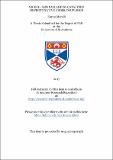Nickel- and palladium-catalysed deprotonative cross-couplings
Abstract
Transition metal-catalysed cross coupling chemistry is a valuable tool for synthetic
organic chemistry, enabling the preparation of compounds of great interest. The
catalytic metal of choice is usually palladium, which generally offer better
performances in term of catalytic activity and easy handling. On the other hand, the
use of nickel in this class of reactions is gaining attention, as it would provide more
economically and environmentally sustainable processes.
Deprotonative cross couplings are a subgroup of these reactions, in which the
nucleophile is generated in situ by direct deprotonation of a (relatively) acidic C–H
bond, for example those of an enolizable ketone or an imine. The reaction products
often represent intermediates towards more complex molecular architectures, by virtue
of the well-known carbonyl chemistry.
The development of a Pd-catalysed methodology for the prototypical deprotonative
coupling, the a-arylation of ketones, is reported in this thesis. It requires significantly
lower catalyst loadings compared to previous reports, and displays good tolerance
towards functionalised substrates. A related protocol for the intramolecular a-arylation
of imines towards indoles was subsequently disclosed: as it requires low catalyst
loadings and displays good scalability and simple setup, this methodology is a
promising hit for industrial applications.
The parallel development of nickel-catalysed protocols afforded an efficient method for
the a-arylation of ketones, using chloroarenes as electrophile for the first time in the
literature. The method was further optimised for the synthesis of an intermediate
towards a commercial medicinally active compound. Building up on these findings,
the first nickel-catalysed protocol for the deprotonative arylation of benzylaminederived
imines was also developed.
Last, the first aqueous palladium-catalysed protocol for the a-arylation of ketones was
investigated. The method proved flexible, showing excellent functional group
tolerance: compounds containing base-sensitive functional groups, halogenated small-molecule
drugs, and Boc-protected amino acids were all suitable substrates.
Type
Thesis, PhD Doctor of Philosophy
Collections
Items in the St Andrews Research Repository are protected by copyright, with all rights reserved, unless otherwise indicated.

